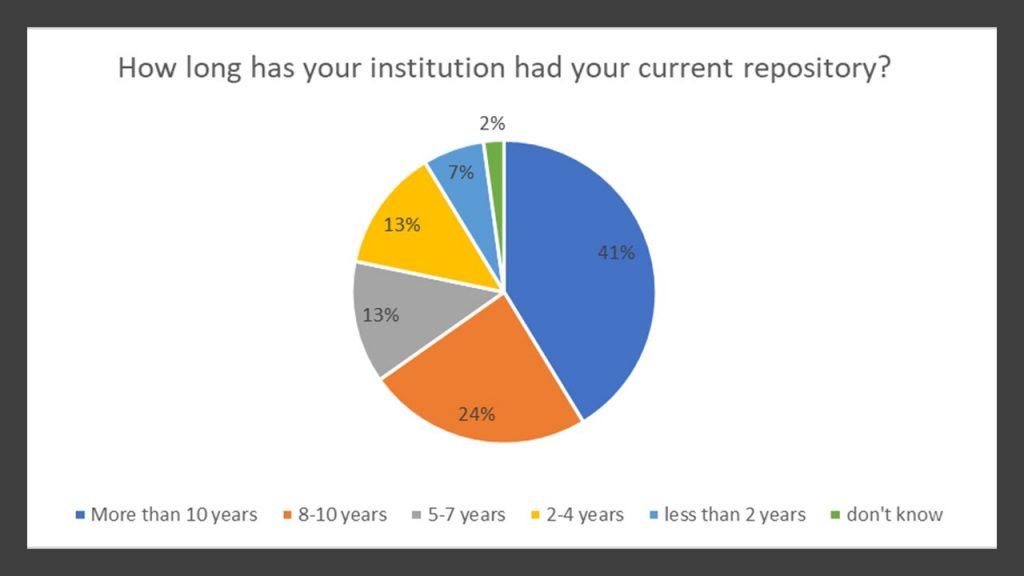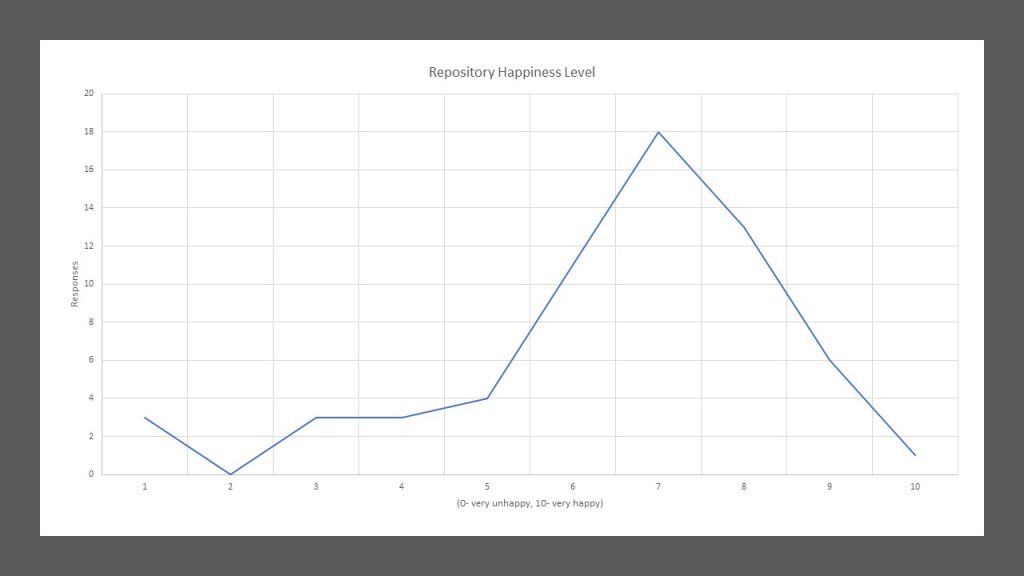Back in the summer of 2021 (if anyone can remember that far back), UKCORR ran two short surveys on research output repositories. The first was called Facts and Figures and asked an institutional respondent to answer a series of questions on the details of their repository (platform, length of use, etc.). The second was called Thoughts and Feelings and invited the entire UKCORR community to express their personal views on their institution’s repository. A summary of the key findings of the two surveys is outlined below.
Platforms and longevity
In terms of what software institutions are using for their repositories, Eprints was the most common followed by dSpace and Pure Portal. More than 70% of responses indicated that their repository was connected to a CRIS or other backend system (most frequently Symplectic Elements and Pure). Institutions clearly stick with their repositories for the long haul- 65% of the responding institutions have had their current platform for more than 8 years.
Happiness
When it comes to happiness with their current repository, the overall picture was a community generally happy with what they already have.
Respondents cited simplicity of design and a good user experience for this, though later responses showed that people wanted to be able to update and improve the design and user experience more easily and agilely. Dated/static systems and a lack of decent reporting functionality were the primary culprits of dissatisfaction.
(Not) All Change
The responses indicated that there was not much change repository platforms following REF 2014 and a mixed picture following REF 2021. 72% reported that they did not change platforms after REF 2014. When asked about plans following REF 2021, 43.5% reported that they were not planning on switching platforms, while another 43.5% said that it was a possibility.
For those now considering switching repository platforms, the top five priorities/requirements for potentially selecting a new platform were: cost, integration with a CRIS, external technical support, OA policy compliance monitoring and integration with other systems. However, follow-up questions indicated that the majority of those considering switching hadn’t yet made any approaches to vendors or Jisc Repository Purchasing Service about this. This is linked to further responses that indicated respondents hadn’t pre-decided what platform they would like to switch to as most were not sure what platforms were out there beyond their own current one.
The most common reasons given for wanting to switch repositories were: wanting more customisation/configuration options, needing easier/improved OA policy compliance tracking, requiring better technical support, implementing long-term preservation and improving discoverability. But even where there is appetite for changing systems, respondents noted that complex decision-making processes and other considerations (financial, resource requirements, etc.) were all potential barriers. And then there’s the issue noted above of not necessarily knowing what it is they’re looking for or what’s available.
Conclusions
Ultimately (and perhaps not surprisingly), what respondents saw as the greatest benefit of their repository platform was discoverability and visibility of their content. But free text responses clearly showed that respondents are frustrated with static platforms that are not adequately inclusive of non-traditional output types and do not allow for customisation or alternative configuration on demand. Others expressed a desire to trade proprietary systems for opensource ones that are community driven and more responsive to changing requirements.
It doesn’t look like 2022, or even 2023, is going to be the year of the great UK repository shift based on these two surveys. But then again, the repository technical requirements of the new UKRI Open Access Policy might focus the institutional mind if current platforms cannot easily meet these requirements.

